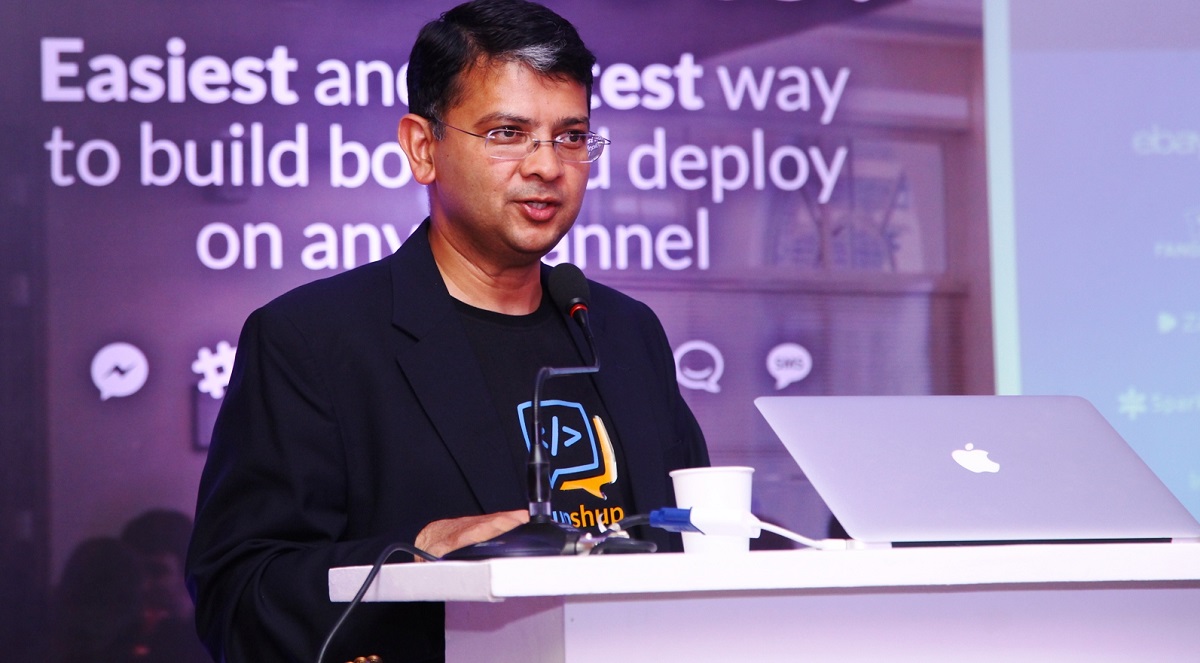
New business should be a painkiller not a vitamin: Beerud Sheth

Indian American co-founder & CEO of GupShup believes that it must satisfy a need in society almost immediately
By Ayanna Gandhi
(Editor’s note: This is the fourth piece in a series profiling Indian American CEOs.)
Many Indians have heard the colloquial term “gupshup” which loosely translates to “gossip.” Beerud Sheth is the quintessential serial entrepreneur.
The Indian Institute of Technology (IIT), Bombay, graduate in Computer Science used both his technical skills as well as his creativity to start the world’s biggest platform for virtual businesses: what he calls GupShup.
GupShup was started in 2004 for the Indian market. At the time and in the place, the internet was not as prevalent as it is today; GupShup was a trailblazer when it came to virtual shopping and selling.
Read: All that matters is that you are taking the shot: Gunjan Sinha (July 31, 2021)
The revolutionary company started as a simple SMS network between businesses and audience; however, since then, it has created over 20 bot platforms which enable companies to communicate with their consumers in customizable ways.
Mumbai born Sheth, who left India to earn his master’s in computer science at the Massachusetts Institute of Technology (MIT), strongly believes that “Businesses have a great need to communicate with their audience.”
Thus, his primary goal today is to enable two way communication between sellers and consumers in any way they can. GupShup provides sellers and consumers with the technological resources needed to best complete purchases.
Specifically, GupShup is able to take one business’s different channels of communication and combine them, thus making virtual selling more user friendly and accessible.
The company’s name is just as encapsulating as its business model. Curious about the name of the company, one asks Sheth for his reasoning behind it, only to hear the opposite of what one expects.
Sheth, who now calls San Francisco, California, home pointed out that “the world is global.” People use “nirvana” and “yoga” on a daily basis without understanding that they are Hindi words.
Thus naming his company GupShup does not feel “like a big deal” to Sheth at all. GupShup is mainstreaming not only virtual shopping but colloquial Hindi words too!
Read: Life is a marathon, not a sprint: Manjiv Vohra (July 14, 2021)
Sheth offers a great deal of valuable advice and insight for both an individual’s professional life and their personal life.
Asked about his inspiration for the company, Sheth says that a successful company may start with an idea, but needs analytical data to ensure that the idea can translate into a viable business that fills a need in society.
In its initial days, GupShup went through many renders, and to this day, the GupShup team continues to modify and refine it to fit the market.
Sheth believes that a new business should be a “painkiller not a vitamin. It must satisfy a need in society almost immediately – the long game might be beneficial, but it’s not what the consumers of our society look for.”
“Remember that “Version 1 is the hardest. [A new company is simply,] revolution followed by evolution!”
Sheth points out the parallels between his professional and personal life. He notes that his kids have taught him that no one can be controlled.
“Micromanaging people is not possible. The best thing one can do is lead through inspiration. Define goals and values and let people go.”
The same applies for starting your own company: set goals and aspirations for yourself and the team, but give people in the team the autonomy to get creative and be brave.
Back in Bombay, Sheth was a member of the IIT math club and won a silver medal at Indian National Math Olympiad.
Before starting Gupshup, Sheth co-founded another extremely successful firm Elance, an American freelancing platform connecting enterprises and individuals, in 1999. Elance merged with oDesk in December 2013. Elance-oDesk was rebranded as ‘Upwork’ in 2015.
Read: Trailblazer venture capitalist Purvi Gandhi paves way for women (July 24, 2021)
He also assisted in the facilitation of Upwork’s first public offering, which resulted in the firm being listed on the stock exchange as a publicly-traded corporation. Before starting his own business, Sheth worked for various financial firms including Citicorp Securities and Merrill Lynch.
Sheth is also an author who has written on business-related issues in a variety of sectors.
His books include: Food For Thought: Restaurants Go Digital To Survive and Thrive; Why 2018 Was the Year of Transforming Messaging Trends; and ‘Why Bots Matter’, a helpful piece on chatbots and how they solve problems in apps and websites.




